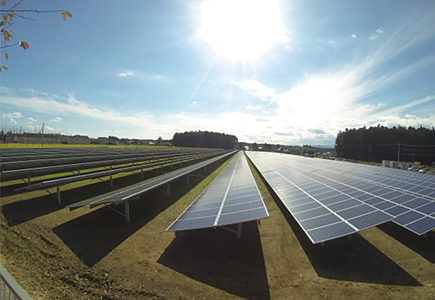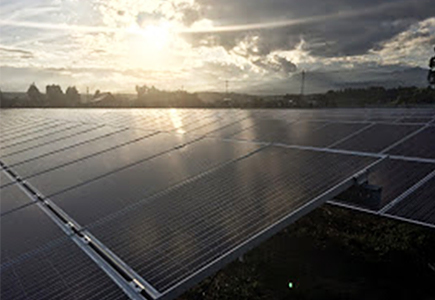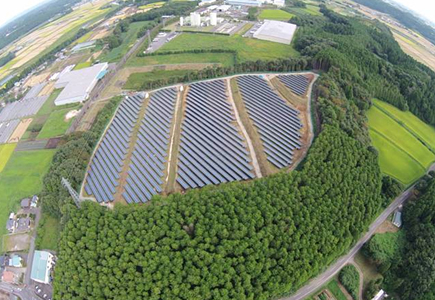FOCUS
THE OPPORTUNITY
Energy crisis in Japan
Following the March 11, 2011 Tohoku earthquake, tsunami and nuclear disasters, Japan faces an electric energy policy challenge. With little in the way of domestic fossil fuel resources, Japan imports virtually all of its oil and natural gas. Until the March 11 disaster, nuclear power had supplied up to 30% of Japan’s electricity, and Japan had planned to rely upon nuclear to meet an ever larger share in the future. A little more than a year after the disaster, all of Japan’s nuclear plants had been shut down. Most may never reopen. And Japan’s future energy mix is more uncertain than ever.
Under any likely scenario, however, renewable energy - solar, wind, hydroelectric, geothermal, biomass and other sources - will need to play a much larger role, much sooner, than anyone expected.
The Feed-in-Tariff
As part of the response to this crisis, in August, 2011 the Japanese Diet (i.e. parliament) passed a Renewable Energy Law that establishes a Feed in Tariff (“FIT”) regime. The FIT went into effect from July, 2012, and is intended to encourage development of new renewable energy projects over an initial 3-year period, possibly longer. Based on the implementing regulations, the FIT assures that qualifying projects will be able to sell their electricity to utility purchasers at a fixed price for a twenty-year period.
The Best, Cheapest Solar PV Equipment Ever !
Meanwhile, the renewable energy industry is suffering growing pains in much of the world. Solar module price/performance has continued to improve steadily, showing some characteristics of other high tech industries such as microprocessors and hard disk drives. Solar panels just keep getting better and cheaper, year after year.
As a result of this, and generous government support, global installations of solar and wind power have soared over the past decade. But manufacturers’ supply capacity has increased even faster than demand. In 2012, austerity across Europe has caused a deceleration of growth in what had been the largest, most active market for renewable energy products in the world, further increasing this oversupply. The result has been a dramatic drop in prices for key renewable power equipment, especially solar PV modules. Of course, a number of manufacturers have been driven out of business, and technologies that once looked promising have been “leapfrogged” as solar PV prices have decreased.
Bringing the Experience of the World to Japan
In Deneb Re projects, we strive to combine the best global practices with best local practices, to adapt the experience of over a decade optimizing solar installations in other countries - especially in Europe - to the unique requirements of Japan. We were among the very early developers in Japan to propose in our projects inverters using DC 1000 volt design-the global standard, but not used in Japan at the start of the FIT in 2012. Likewise, as a number of high quality string inverters have become available for use in Japan during 2014, we have been among the early advocates for using these in our projects. We support project designs that, where practical, use the existing land contours, but that meet Japanese requirements for drainage and other development-related concerns.
A Perfect Combination of Circumstances
The combination of (1) a real need for renewable generation, (2) a Japanese FIT regime with generous pricing, and (3) global oversupply of equipment, makes this the perfect time to develop and invest into solar PV projects in Japan.
CORPORATE PHILOSOPHY
DenebRE is a for-profit company, but we are a bit different.
Meeting a Social Need
First, we have chosen our initial business area based on a conclusion that there is a genuine social need we can serve, a need that others are not yet serving effectively. Japan needs a lot more renewable energy to meet its current crisis, regardless of what can be achieved with other sources and conservation. (Indeed, not only Japan, but the entire world needs to develop better, cheaper, and more renewable energy resources to help combat global warming and to move toward sustainable economic development in the 21st century.)
Keeping the Public Trust
Second, we understand that the feed-in-tariff is reliant upon a subsidy paid by Japanese electricity consumers. As such, it is our duty to deserve and keep the public trust.
Our projects should give the ratepayers good value. We need to bring the best, most cost effective technologies and methods in the world to Japan in order to push down solar PV cost. We need to accelerate the day when solar PV in Japan reaches cost parity with other traditional energy sources.
We must be transparent with regulators in order to make sure that as we achieve lower costs, the feed-in-tariff rate for new projects gets reduced and the bar is raised higher for us and others.
And we must push for other changes in energy policy that will make electricity generated with solar PV closely integrated into the supply system, rather than wasted.

Having Fun
Finally,
our projects should be fun. Of course, we will work very hard, and will be tough negotiators to reach an agreement. But we want to work with others who share a similar perspective, who are passionate about this business, who are easy to work with and, yes, fun.



